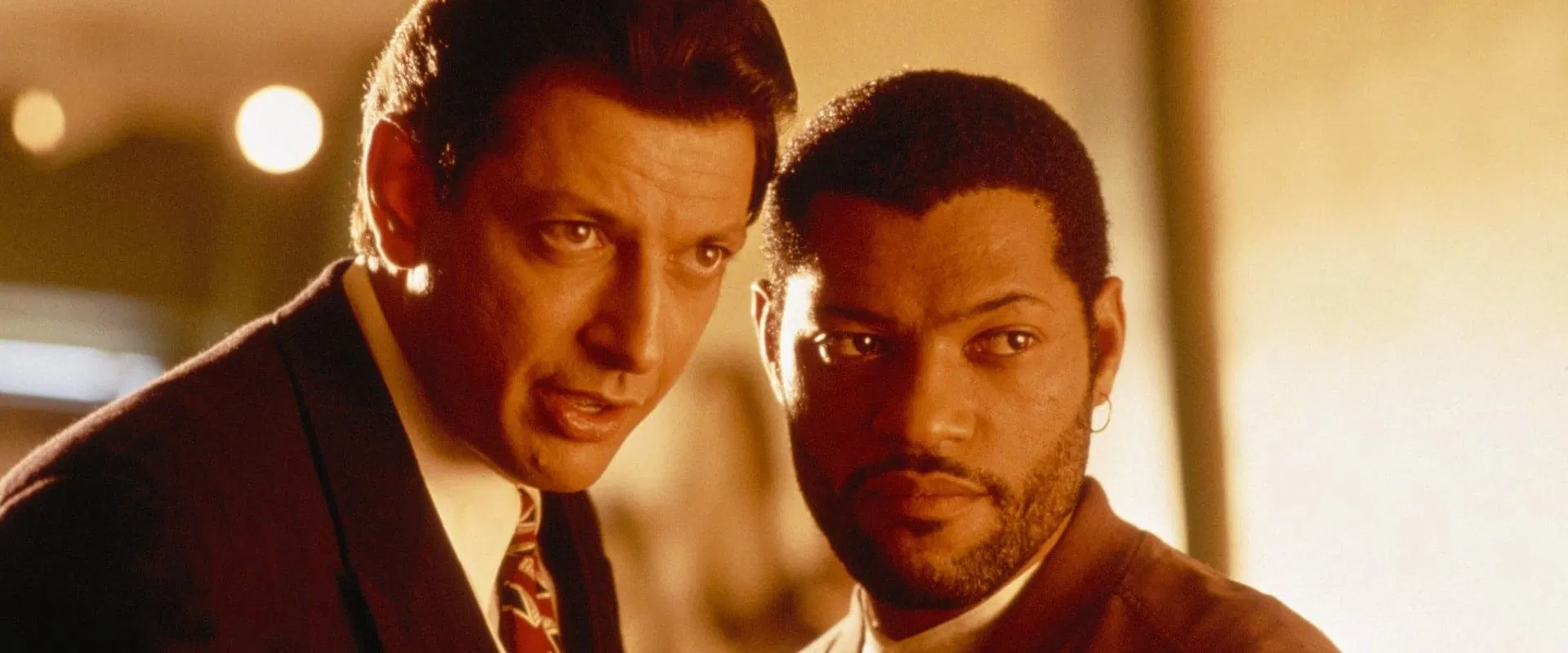Bill Duke’s Deep Cover wears its neon-lit grime like a badge of honor—a garish, stylized crime thriller dressed up in the trappings of hardboiled noir and early-’90s urban anxiety. If the movie’s mood—the slick rain on Los Angeles streets, the burnished cathedrals of vice, and the snaking synth-and-hip-hop soundtrack—is its raison d’être, then what we get, ultimately, is exactly that: a heady, immersive surface that is always beckoning, yet never really giving.
At the film’s center, Laurence Fishburne offers us Russell Stevens Jr., an undercover cop so haunted by his father’s squalid self-destruction (shown in the film’s punctuation-mark prologue) that duty and revenge bind around his chest in the same agonized knot. Fishburne is every inch the actor’s actor here: glowering, conflicted, endlessly magnetic—he radiates the quiet, unspoken fury of a man who never really decided to become a cop; he just couldn’t bear being the son of an addict. One wishes the script gave him room to become more—he remains largely a cipher, as if Bill Duke would rather Fishburne wear his anguish than let him voice it. There’s a consistency to Fishburne's cold authority that compels, yet the role is all impact and little aftershock—no matter how the camera lingers.
Jeff Goldblum’s David Jason is a feverish oddity—a lawyer itching to be a player—hurling out lines that would have sounded arch in a comic book and rarely seem anchored in the drug-bloated, craven world this film half-heartedly wants to indict. Goldblum, in a different register from everyone else, teases us with eccentricity but never quite finds the film’s pulse. Fishburne and Goldblum are a pairing that promises dangerous electricity but keeps tripping over mismatched rhythms; tension simmers and crackles, then fizzles when Goldblum’s overcooked asides disrupt the pulpy spell.
The plot, meanwhile, ticks along faithfully: Stevens rises through the byzantine drug hierarchy, slipping further from the badge and closer to some imagined point-of-no-return. The narrative scaffolding—romance, betrayal, blurred lines—would have seemed daring in a post-Serpico, pre-Bad Lieutenant moment. But here, in a film that gestures toward high-stakes morality and systemic rot, we’re left with the old chestnut: is our cop so deep in cover he’s lost to us? The movie raises the question, then moves on briskly, as if afraid of what an honest answer might reveal. It wants to thrum with moral queasiness but is all too eager to rush us to the next shootout, the next stakeout, the next double-cross. Each turn is as expected as the last; we are cued when to feel tension, relief, or outrage, but it’s all by design—no surprises.
For all its yearning to paint a portrait of urban decay—addiction, corruption, and all that bile that bubbles in the gutters—there’s a curious, almost prurient detachment in Deep Cover. The dialogue, with its slurs and sour poetry, works overtime trying to convince us we’re in the belly of the beast, but the effect is more self-consciously gritty than authentically ragged. The film keeps gesturing at anger and desperation, but the script’s flourishes ring hollow—words that want to cut, but only graze. Compared to the depth and corrosive energy of the best cop dramas, this is sociology-by-numbers, colored mostly inside the genre lines.
And yet, visually, Duke and his team are working at full throttle. The film bathes its nocturnal absurdities in feverish color, playing the city’s nightscape as a seduction and a threat. The soundtrack—anchored by Dr. Dre and introducing Snoop Doggy Dogg—gives the movie a cultural jolt, as if daring the narrative to keep up with the restless innovation of its music. For a moment, the film seems to matter—if only as a capsule of its era’s aesthetic ambitions.
But in the rush to look, move, and sound cool, Deep Cover’s inner life is barely a whisper. It wants the urgency and the tragic sweep of true noir, but stumbles into cliché: the fall from grace, the crime-world romance (Victoria Dillard’s Betty, left to wander the narrative’s edges), the epigrammatic voiceover. It’s a film suffused with the air of consequence—a slow, stylish wail against the War on Drugs—but ends up tautologizing its stakes, trading the promise of a searing social critique for another glossily paranoiac ride.
In the end, Deep Cover stands as a minor, moody diversion—sensually rich but emotionally limited, fascinating for its moment and its polish, but, like too many of its characters, choosing illusion over reckoning. After the credits roll and the reverberations of Dre’s theme subside, you’re left with the glimmer of something darker and deeper—never fully realized. There’s a line here between artifice and authenticity, and Deep Cover—stylish, restless, above all wary—spends its runtime walking it, never quite daring to fall.


